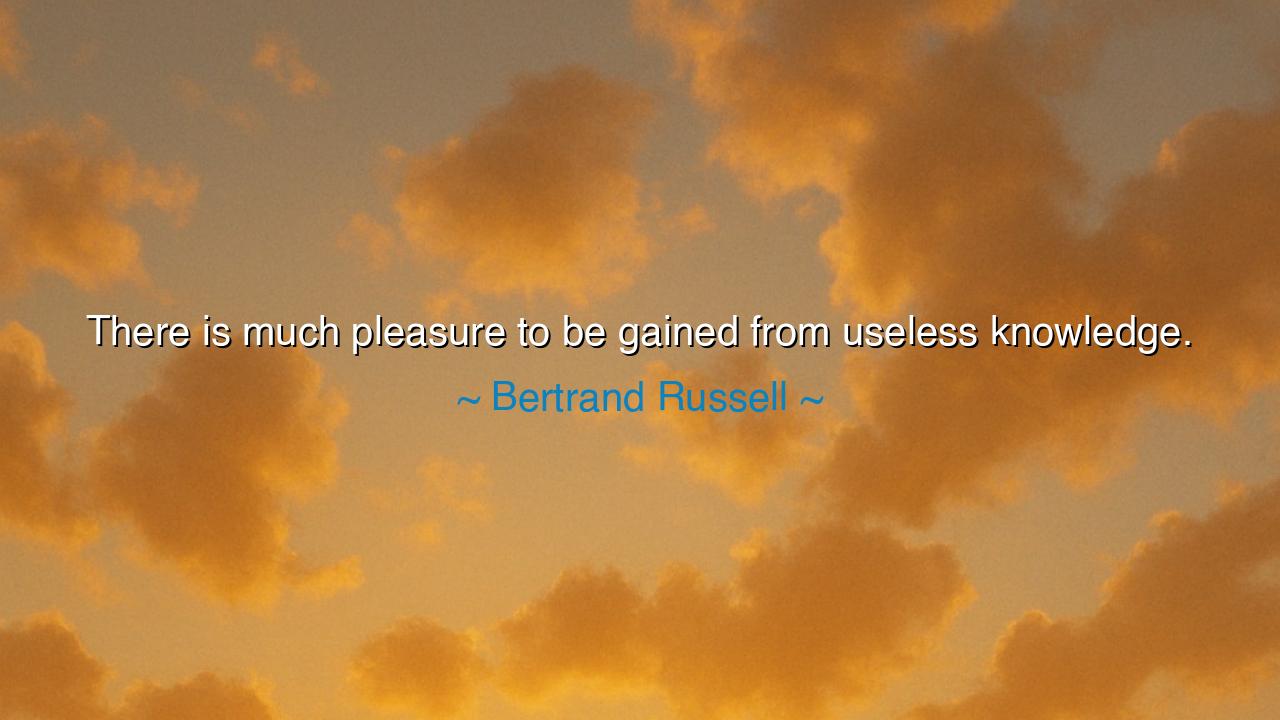
There is much pleasure to be gained from useless knowledge.






Hear the words of Bertrand Russell, philosopher of the modern age and seeker of truth: “There is much pleasure to be gained from useless knowledge.” At first hearing, this sounds like a paradox, for the world praises only what is useful, only what yields profit, only what can be measured in gold or power. Yet Russell, like the sages of old, reminds us that not all learning is for gain, nor all wisdom for survival. Some knowledge serves no practical end—and yet fills the heart with joy, wonder, and freedom.
The ancients understood this well. Why did the Greeks map the stars, when no ship yet sailed by them? Why did they measure the distance of the moon, or debate the nature of the soul? These inquiries did not feed their bellies nor clothe their backs, yet they lifted their spirits, giving them a sense of belonging in a cosmos vast and beautiful. Knowledge, even when "useless," brings delight because it satisfies the soul’s hunger for meaning. To know, simply to know, is itself a form of pleasure.
Consider the story of Gregor Mendel, the quiet monk who studied peas in his garden. To many, his observations seemed trivial, even laughable. What use was it to count the colors of flowers and the shapes of seeds? Yet his so-called “useless” pursuit gave birth to genetics, a field that transformed agriculture, medicine, and biology. Here is the hidden power of “useless” knowledge—it delights the seeker and, in time, may become the cornerstone of human advancement.
But Russell’s teaching also goes beyond utility. There is joy in poetry that earns no coin, in music that heals no wound, in gazing at the stars though they are beyond our reach. The mere act of learning a language, of studying the life of ancient peoples, of pondering questions without answers—all these give the mind a freedom that the pursuit of only “useful” things cannot provide. For man is not beast alone, made only for survival; he is a creature of wonder, and it is in the “useless” that his nobility often shines.
There is also wisdom here against pride and greed. To seek only useful knowledge is to make learning a servant of ambition. But to seek the “useless” is to make learning a friend of the soul. When one studies for no gain, one learns humility. When one contemplates for no reward, one learns to love truth itself. Thus, the pleasure Russell speaks of is not shallow entertainment, but deep joy—the joy of a free mind, a mind unchained from necessity, dwelling in beauty for its own sake.
The lesson for us is clear: do not confine your learning only to what is demanded of you. Seek also the “useless,” the knowledge that feeds the soul rather than the purse. Read widely, explore deeply, and let your curiosity wander. Study the stars though you are no astronomer, learn music though you are no bard, read philosophy though you are no scholar. For these things bring pleasure, enrich the spirit, and open doors of understanding that usefulness alone can never provide.
What then must you do? Make time each day for learning without purpose. Delight in curiosity. Fill your heart with wonder at the mysteries of history, nature, and thought. And do not despise the “useless,” for it is often in these hidden places that the greatest treasures lie. When you walk this path, you will find joy in both the practical and the poetic, and your soul will grow vast enough to embrace the world.
Thus remember Russell’s words: “There is much pleasure to be gained from useless knowledge.” For in truth, no knowledge is useless if it brings joy, expands the mind, or deepens the spirit. Seek it, cherish it, and pass it on, for in such pursuits lies not only pleasure, but the fullness of being alive.






AAdministratorAdministrator
Welcome, honored guests. Please leave a comment, we will respond soon